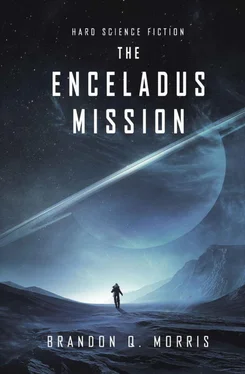After a few weeks of huge enthusiasm, the first critical voices began to be heard. The media, whose documentaries and features were experiencing declining ratings, and whose audiences were desperate for something new, gave these critics plenty of airtime. Suddenly, the biologists were confronted by talk show hosts firing pointed questions that might be scientifically implausible but could be understood by the common people. Might not this new form of life present a danger to us all? Wouldn’t a cell that survived at minus 180 degrees Celsius be far superior to the feeble and fragile life forms on Earth? Might there be a sleeping giant on this moon of Saturn who could be awakened by a visit—with unpredictable consequences?
Worried people are grateful if the state takes care of their problems, while they often distrust entrepreneurs who might not be working in the best interests of the nation or the Earth. To Martin, it seemed as if the space agencies had been waiting for this moment. At a shared event in Peking, they presented the plans of China, Europe, Japan, India, and the United States to the world, and at the end they even presented a special guest. It was the head of the Russian space agency, Roscosmos, who announced they were happy to support this grand vision for humanity, and were all too glad to return to the international stage.
The short period of preparation had not been sufficient to develop specific plans. However, the state agencies presented a set of detailed rules to prevent any contamination of Earth—and insisted the space travelers involved would not have to be interned on Mars for the rest of their lives, despite a group of U.S. congressmen having demanded so. These governing bodies also had an elaborate agreement on the sharing of costs and resources, let alone the glory, so no nation would gain more prestige than the others.
The experts would later work on preparing a mission concept. For the first time in the history of mankind, they promised money would not be an issue—so long as the mission would not eat up more than 80 or maybe 100 billion dollars. The private space corporations soon realized their role in this endeavor would be one of paid service providers.
After all, they had not yet presented a truly convincing concept. For a trip to Saturn, a spacecraft would take approximately six times longer than a trip to Mars. Instead of the 120 days of flight time that Elon Musk, the head of SpaceX, had planned for his spacecraft Heart of Gold , the ship to Saturn would need two years just to get there. Zero gravity and cosmic radiation would turn this journey into a suicide mission for the astronauts. Space travelers who returned to Earth as a pulpy mass of bones, or not at all, could not sing the praises of their bosses on talk shows. None of the countries involved wanted that.
Finally, a private company specializing in constructing on-demand satellite accessories succeeded in coming up with a solution. Princeton Satellite Systems, a spin-off of the university of the same name, had developed the Direct Fusion Drive (DFD) using only a small budget. This drive system was based on the nuclear fusion of helium-3 and heavy hydrogen (deuterium). This reaction did not produce any neutrons, which would have turned the material of the reactor radioactive sooner or later. Rather, it produced electrically charged protons and helium ions that could be diverted toward the thruster by using magnetic fields, thus propelling the spacecraft. At the same time, this would also generate electricity—two megawatts, for a total engine output of ten megawatts, the researchers at Princeton Satellite Systems estimated.
The fact that this was merely an estimate initially concerned the leadership of NASA’s Jet Propulsion Laboratory, because the DFD system had never been tested in space. Princeton Satellite System had created a 1:1 model in a lab and started it successfully, roughly confirming the projections. However, the DFD had not yet been used as a spacecraft drive. There had been no need for it so far—on a trip to Mars, the flight time was bearable even with conventional engines, and missions to farther targets had always been unmanned, so speed was not as important.
Martin had been partially responsible for the first test of the DFD. He had pointed out 27 bugs in the control software to the head engineer of Princeton Satellite Systems. The Japanese engineer, Hayato Masukoshi, was extremely embarrassed by this discovery, and he offered his immediate resignation to the chief executive officer. To the engineer’s surprise, though, he was ordered to test the DFD in the weightlessness of space, together with this ‘JPL nerd.’ Some time later, Hayato told Martin how the CEO had described him.

October 15, 2037, NASA
Martin had always thought he was in control of his life. If I had known a bit of troubleshooting would sentence me to the depths of space, would I have managed to overlook those bugs? A few memory leaks here, a race condition there. ‘No one ever died from that,’ like Mother would say. In reality, however, a number of people had died because of such bugs, since software entities had been allowed to act independently in critical areas. India’s autonomous robots, for instance, had caused a massacre in a Hindu temple during the Kashmir War. Later, this event had been officially traced to a buffer overflow in the AI. By now the analysis of this source code had become required reading for computer science students. No, it was only logical that Martin found himself here today, even though in retrospect he would never have seen it coming.
Of course, back then it had been no coincidence that his boss had sent him and Hayato to Tiangong-4. At that time, Martin was being considered a secret hero in his department. He felt uncomfortable about it, but it was a fact and could not be undone. All he had done, he thought, was sit around and press the right key at the right time.
Naturally, Martin had fought tooth and nail against this assignment into outer space. “After all, it would be sufficient if the Japanese man flew into space,” he argued. Martin believed he would be better able to analyze the data generated by a test run of the drive while sitting comfortably down here in his office, but his boss did not budge. “I haven’t even had any basic astronaut training,” he reasoned. When he brought up this point, his boss just smiled as he reached into a drawer and pulled out a letter-sized brochure designed in elegant blue.
The Adventure of a Lifetime, Martin read, after his boss had silently handed him the folder. “Blue Origin will take you to the edge of space and back.”
Martin had made the mistake of reading the brochure before going to bed. The thin leaflet advertised space trips in the capsules owned by the e-commerce billionaire Jeff Bezos. They looked elegant and sleek, and the passengers wore body-hugging suits of blue material while smiling at the camera. Training, the brochure said, was completely unnecessary. You must spend two days learning about launch, landing, and safety procedures, and then you could go into space. If only I had researched beforehand who was trying to participate in the Enceladus project, Martin reflected. It appeared Bezos had reserved two of his spacecraft for transport flights. After a boom in the 2020s, space tourism was no longer as popular as Bezos had hoped.
Martin imagined slowly getting up from his launch couch, carefully floating to the wide observation window, and then promptly throwing up all of his stomach contents. His fellow passengers would turn away from him, partly disgusted, partly amused, and he would be unable to shake off his vertigo for the duration of the entire flight. Even the mere idea made his innards cramp.
Читать дальше













